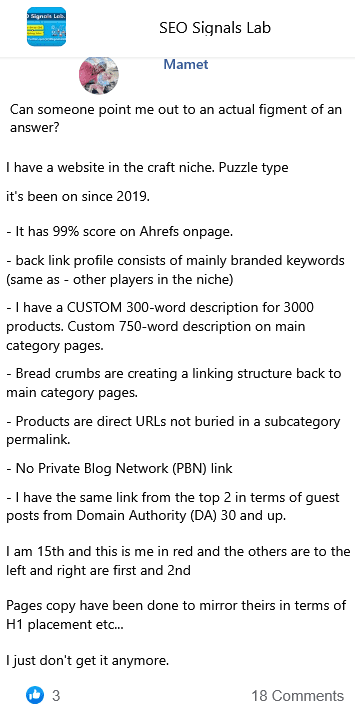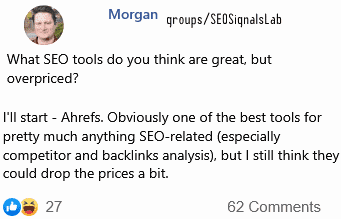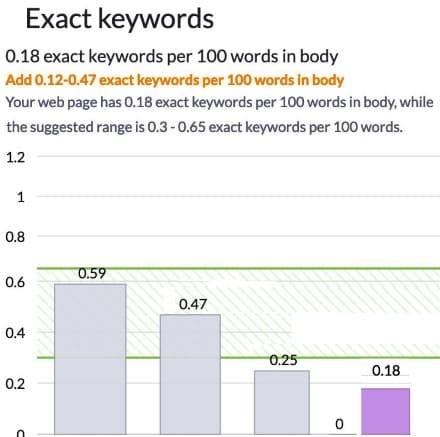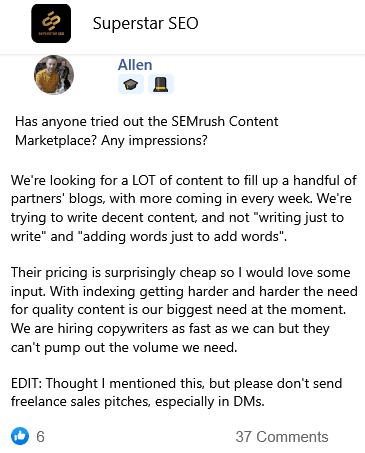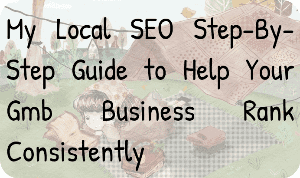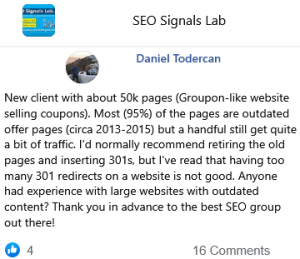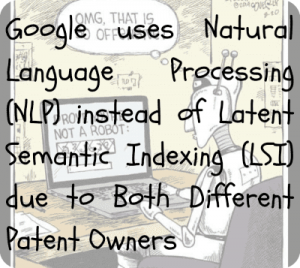Can someone point me out to an actual figment of an answer?
I have a website in the craft niche. Puzzle type
it's been on since 2019.
– It has 99% score on Ahrefs onpage.
– back link profile consists of mainly branded keywords (same as – other players in the niche)
– I have a CUSTOM 300-word description for 3000 products. Custom 750-word description on main category pages.
– Bread crumbs are creating a linking structure back to main category pages.
– Products are direct URLs not buried in a subcategory permalink.
– No Private Blog Network (PBN) link
– I have the same link from the top 2 in terms of guest posts from Domain Authority (DA) 30 and up.
I am 15th and this is me in red and the others are to the left and right are first and 2nd
Pages copy have been done to mirror theirs in terms of H1 placement etc…
I just don't get it anymore.
3 👍🏽318 💬🗨
📰👈
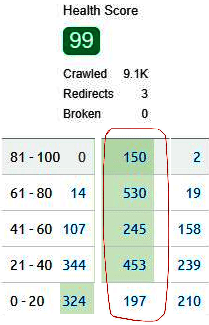
No PBNs links – that might be the thing
🤭
Well, only answer…going bonkers otherwise
Suski » Mamet
What does the back link profile of your competition look like? Perhaps looking into that could be the answer
Mamet ✍️
Well, the key is probably in there…as you can see in the photo. I have more links from high Domain Authorities (DA)s that talk about craft…so 🤷♂️ nothing is shown clearly that is why I am wondering about Private Blog Network (PBN).
Ammon 🎓
It sounds as if you are trying too hard to be equal to the rivals and competitors, instead of trying to get a mile further ahead. Stop worrying about what links they have so much, and work more on getting the links they don't and would sell their mothers for. Build your empire, not a copy of theirs with one more bell and 2 more whistles.
Well, I am not worrying or copying their links. It's just a matter of where I'm am when I review their positions and mine.
1) I looked at the content. I have 1000 words on the home page they have 350.
2) I have a blog coming out every 2 weeks they have no fresh content coming out.
3) I have custom 350 words for 3000 products. They have copy-paste the same text on all the products.
4) Their domain is 2 year old, their DA is lower.
5) My crawl stats are 99% and 95% according to SEM rush and Ahrefs
I started getting the same links as them after still not ranking with better and higher DA backlinks. Now, on top… I have all the same links as them and more I am still not getting top 5 pack…
So, I am confused where is the disconnect
Ammon 🎓 » Mamet
These are tool based metrics, and what you need is Marketing based thinking. When was the last time you, as a user of the internet, counted the words on an article to decide whether you liked it or not? Never, right?
So why would Google or any other engine ever use it as a metric? Again, the answer is never.
The entire idea of word counts dates back before Google, to when on-page factors was all their was. Because back then you could look for a trend in the SERPs, when everything in that Search Engine Result Page (SERP) *had* to be based on the same metrics – the on-page ones, because there was nothing else.
Then along came Google. For years, some of the highest ranked urls were actually redirect pages with no content set to a 302 (Amazon especially worked that way). There were pages ranking for amazingly common, highly used words that didn't include those words on the page at all, because those words were either in or near the anchor text to thousands of links to the page.
At which point, on-page analysis became idiocy. The 'Cargo Cult' of online marketing.
The metric for the content on your page is either, how many sales does it directly contribute to, *or* how many great links did this naturally attract without me having to do outreach. A combination of the two is fine. Anything else is just BS from someone wanting to sell you their tool, or their method.
You blog every 2 weeks. That's great as long as those blog posts *do* something good for you. Do they earn their own links on merit? Do they drive sales? Because once again, the stuff about you must have fresh content is BS sold to you by people who mostly sell content creation. Freshness only counts in specific queries that need it – News, Weather, Stock prices, Events…
You're throwing around all these metrics you have been sold on, like Domain Authority (DA) and wordcounts, and none of them mean anything to a search engine. None of them.
Think like a marketer, trying to sell products to humans. If you have a site that does that really well, then Google employ thousands of scientists tasked with changing the engine and algorithms to MAKE you rank.
Mamet ✍️
Well, if you have 2 apples, you need to place one and you need to place the first 2nd. You need something measurable to place one on top and one at the bottom.
I look at the competition, they have a newer site. With copy paste content on all their pages, majority of their links are coupon-based sites that you can't sign up for.. 300 words on their homepage, no text on their category pages. A couple of high links from "high traffic" websites that is it.
I am there with 4% conversion rate. Custom content catered for each page. More links from big traffic websites that talk about the exact same subjects. More content to give to Google to understand what each page and categories are about. These are actions that have been undertaken…
I get what you mean in the theory. but "trying to sell products to humans" is not telling me how a guy with junk links and copy-paste content on all pages and no social presence whatsoever is first and second 😂
Truslow 🎓 » Mamet
See my answer below – you mentioned "copy and paste" content in your reply above. My answer addresses that (even before I read your comment here) and explains how that, in some cases, may actually work in their favor.
As for "trying to sell products to human" not being a valid consideration for Search Engine Optimization (SEO)… it's ultimately the PRIMARY consideration for SEO
Google is NOT in the business of ranking sites. Google is in the business of "providing answers and solutions to humans by presenting them information from the web."
As such, our first job as an SEO is not to force Google to try to rank things in a certain way (that's not what it's there fore) by presenting them with a specific number of words or following some ranking formula some tool says to use. Our FIRST job is to ensure that Google knows exactly what our page (and site as a whole) is about and what it offers. And, interestingly enough, the way you do that is by considering factors that are good for users. If a user is on your home page and is looking for something specific – you want to give them a clear and easy path to get there as well as an indication of some sort that if they follow that path, they'll get to what they want. That's exactly what Google needs to understand it all too.
Step one is to get Google to understand your page (and other pages) and how it all fits together so that it can consider the pages for ranking in the first place. THEN some of the little tips and things the tools do can help you rank better. If you don't take the steps to get yourself qualified to be in the batch of results that need to get ranked in the first place – none of those little tricks are going to help you.
Ammon 🎓 » Mamet
If he knows SEO, or has hired someone like me, a huge part of the job is to NOT show *how* I rank. The last thing I want to do as an SEO is produce a template for my rivals to copy. Instead, I'll often put aside a little time to putting in some deliberate red herrings and fake trails to make them waste time on.
For an example, I had a client with a few really powerful, high authority links, but noticed a lot of recurring visits from IPs that were competitors. So we buried those good links under a ton of junk ones, needle in a haystack style. That way there's a good chance some rival will think they need thousands of links, instead of realising that almost all of the power came from just 2. Better still, the competitor can't see that I disavowed a large number of the links, so he may even get himself a nice penalty issue.
I used to hide what were effectively 'doorway pages' in plain sight. They were made deliberately in a way to rank, while leaving rival SEO users scratch their head at *why* they ranked, other than that they seemed to be good pages.
Now, you're not in one of the super-competitive niches like Finance, Travel, etc. where you expect to run into SEO users like that a lot, but even they have hobby sites and affiliate sites. You never know the expertise you may be up against until you try everything you can think of, carefully following what they do, or what they let you see of what they are doing, and yet still can't catch up.
So make your own path. Google rank you on signals, not on how other sites in the niche are. You could do everything completely different to every other site in your market, except get a link from the homepage of some internet giants, and you'd rule that SERP
It sounds like you have the topical links sorted. So broaden out. Get a broader context of links. Get an influencer or two talking about your product, or even pay them for their time and have them in content on your site. You'd be amazed how cheaply you can hire a B-list celebrity for a whole day. A couple of thousand does it. Hiring a videographer with equipment for the day costs more than the 'star' does.
Think outside the box. Get the links your competitors haven't even thought of, not the same links but more.
How about news links? You do puzzles of some kind. Are any of them the kind of thing you could donate to a local hospital? Either adult puzzles for a cancer ward where patients have to sit through treatments and could use a distraction, or perhaps children's wards for puzzles that suit younger users? Could you invite a local newspaper reporter to the event where you present a supply of these puzzles to the hospital?
Think outside the box. You're supposed to be good at puzzles, right? 😃
Mamet ✍️ » Truslow
We agree that Google is not in the business of ranking and yet there is a rank…there is an apple on top and one at the bottom. Now, i listed all that my competition has done and all that I have done. What would be your recommendation then? I am struggling to see the clear solution in your comment above. I see the overall goal of Google explained and that little tricks wont help me. Would you then have some words of wisdom to offer? Something actionable, practical that is a clear step to be done?
Mamet ✍️ » Ammon
Ok i see, best advice. Thanks 🙌
Hak Ty » Ammon
Damn. You're not even on the same level as all the gurus out there. Better start charging fees
Ammon 🎓 » Hak Ty
I'm not, that's true. It has been documented in the past that I am level 8
https://moz.com/blog/levels-of-search-marketing-knowledge🤣Levels of SEO and Search Marketing Knowledge
🤭💟2
📰👈
Truslow 🎓
Does it actually take 300 unique words to describe the the unique aspects of these puzzles?
Also… One killer trap I see a lot of folks falling into in recent years is that, in their fear of creating duplicate content, they often make it difficult for Google (and users for that matter) to figure out the common aspects of things.
In modern Search Engine Optimization (SEO) – especially when it comes to products that easily translate into entities – we're not really playing the "Match the Keywords" game anymore. We're actually trying to create and describe entities and how they connect using Semantic SEO Techniques. Here's a good primer on that subject https://gofishdigital.com/what-is-semantic-SEO (This is the second time in an hour I've linked to that… Bill's going to wonder what the heck is going on with traffic today? lol)
Now… let's say that you're making wooden block puzzles. They're different shapes, sizes, number of pieces and so on – but there are lots of things that are common across them – or across various sets of them. Some may be "animals" and some may be "geometric shapes" and so on. And they are ALL likely going to be "hand made" and maybe they are all made of the same material like "pine" or "oak".
In your copy you're making everything "unique" to avoid duplicate content, but as such you run the danger of making it difficult to determine what ACTUALLY makes this one different from that one.
Since you're using different words to describe the process of them being "hand made" – it could be sending Google a signal that they aren't all made the same way. That can be problematic because something that is "common" has now become (and must be considered) a "unique" facet of the product for ranking purposes.
In many cases, you are better off classifying AND describing common aspects between products in the EXACT same way. By doing so, you say "This feature or aspect is the same any anything else that uses this verbiage. And the differentiating factors and things that make these items unique are the things where I'm using different words."
Combine this with good organization, product attributes that help create entity attributes that Google can apply to the knowledge graph and rank your stuff and all the other Semantic techniques out there – and then you're not just "ranking based upon a match" – you're ranking because Google knows what the person wants based upon their search term and knows that you have what they want – in broad terms or down to very specific aspects – because of its depth of understanding exactly what you sell.
Now… each approach is different so there's no one blanket answer here – but hopefully this post gives you some ideas on things to start learning about that can help you grow in your ability to get these things known and ranked.
Ok I get it. Thanks for taking the time to explain this
📰👈
Ammon: Google don’t count Words or Keywords, but they count Page Speed
Ammon: Click Through Rate (CTR) in SERPs has Zero Effect on the Scoring of the Site
